psychedelic trⒶnarcho storyteller, d.i.y. librarian, and professional fool
Don't wanna be here? Send us removal request.
Text
Book Review: Rose Madder is Tense, Exhilarating, and Red All Over
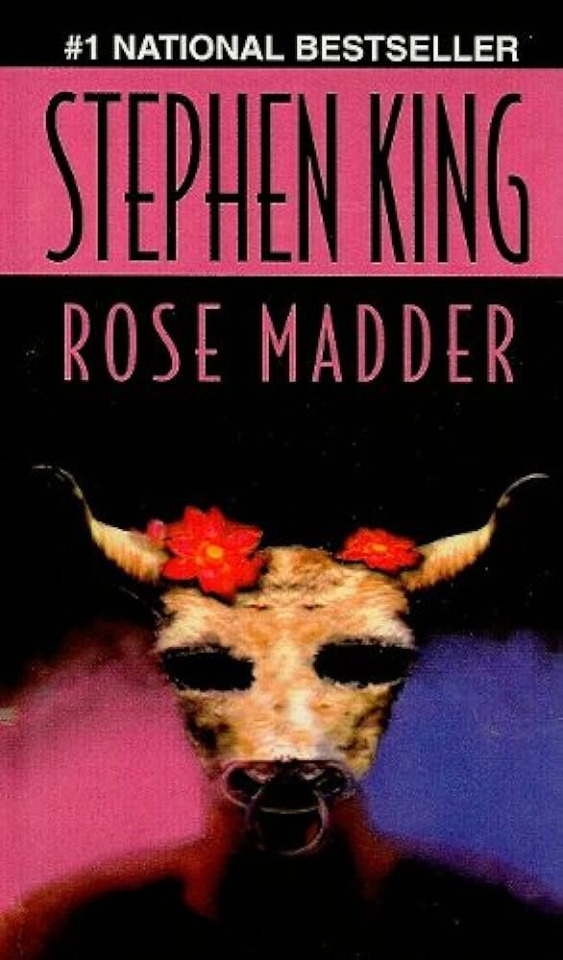
In On Writing, his treatise on the craft, Mr. King described Rose Madder as a "stiff, trying-too-hard novel", and with all due respect to the man himself, i couldn't disagree more. It seems, particularly among his female readers, that i am far from alone in this assessment, with many i've seen in online spaces regarding the book as an underrated gem in his catalog. Though lacking the full punch and intensity of the somewhat similarly-themed Gerald's Game, this fantasy spin on the simple concept of an abused wife escaping her abuser is an exhilarating ride. Weaving Greek myth, or perhaps more accurately the artistic rendering of it, with a grounded thriller, King crafts a book that, while not one of his finest, is certainly a very fine novel indeed. i picked up the book recently on a whim while visiting family, finding it in a box of my stored items in the basement, where it had ended up after i had purchased it in a thrift shop back in the heyday of my high school King craze. Unsure of what to expect, i picked the book based on a whim, not even really knowing the premise beyond a woman accessing a fantasy realm.
King's character work is at its best here in Rosie McClendon, who, if not occupying one of his absolute best books, certainly stands shoulder-to-shoulder with his best protagonists. It's less sharp in her supporting cast, but that doesn't do much to take away from the story—it is, after all, Rosie's story, Rosie's fairytale, and after the hell she has endured, if her love interest Bill is little more than sexy and kind, what's the problem? Rosie deserves someone sexy and kind, and i was biting my nails up until the end, hoping that the narrative was not going to tear her away from this bit of sweetness. The surrounding cast, Gert and Anna and the rest of the girls at Daughters and Sisters, are enjoyable to spend time with, and the fight between Gert and Rosie's nightmare ex in particular is a highlight of the whole affair. The villain of the piece is flat as a board, but that's all he needs to be; Normal Daniels is a cartoonishly vile horror, reminiscent of Desperation's Collie Entragian without the excuse of demonic possession for his poor manners. That is, however, all Norman needs to be, and by the end of the book, all he is: a relentless, pursuing force, something to really light the fire under the ass of our heroine.
At the time the novel starts, he's been lighting fires under Rosie's ass for a long, long time, and from that simple inciting incident, her moment of lucid realization that if she doesn't leave he will kill her, i was hooked. The danger of leaving is incredible, her husband not just a nasty piece of work, but a nasty piece of work with a shiny badge and near perfect immunity because of it. The passages from his perspective are tense and uncomfortable, like being shackled to a radiator and having to listen to its seething, fuming thoughts. Recalling another King villain, he's Cujo on two legs, a rabid, keening beast who will stop at nothing to take back what he sees as his. The battle between Rosie and her ex husband is a simmering, powerful conflict, one that reaches a grimly satisfying conclusion thanks to a strange painting she encountered soon after leaving him.
Where the book falls short, it's not because of any particular flaws with the text, merely that there are long portions that are simply efficient and enjoyable as opposed to the occasional glimmers of real brilliance at work. The fantasy aspects in particular, while by no means poorly-executed, are often less exciting than the events happening in our world, though the narratives come together satisfactorily in the end. There are also, unfortunately, a few instances of the ugly stereotyping that sometimes worms into King's older works, particularly a reference to one character's minor sexuality being a result of molestation, that are eye-rolling and date the book. One complaint i did have is that the reveal of the eponymous Rose Madder's true form seemed to lack the imagination found in the rest of her conception, but that's a nit-pick at best. The only aspect of the story itself that bothers me is what i consider to a rather suspect use of the "erasing someone's memories for their own protection" trope, but that's may be due to a personal dislike of the trope in general.
In short, Rose Madder is indeed an underrated gem in Mr. King's catalogue, with a captivating protagonist and taut, tight tension woven throughout. In Rosie McClendon, like in Jessie Burlingame, i found a powerful symbol of resilience. Rosie is the kind of woman i strive to be: relentlessly kind without being meek, brave, unafraid to advocate for herself, unafraid to be afraid. i myself had my own awakening recently in my own life, and when i picked up the book, from the moment i met Rosie, i saw something of myself in her, and was prepared to follow her anywhere. Why wouldn't i? She's really Rosie and she's Rosie real. You'd better believe me—she's a great big deal.
3 notes
·
View notes
Text
Book Review: Lolita is Not Her Name
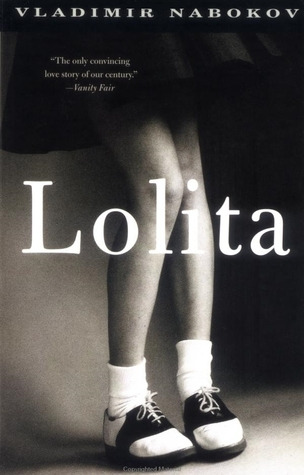
Her name is Dolores Haze. Let's start with that.
Nabokov's Lolita is a difficult book to categorize, criticize, discuss and dissect. In the popular imagination it persists, for whatever reason, as a tale of taboo romance, a red flag analysis that should probably spur an investigation of your hard drive. If there is any lingering doubt that we're living the Bad Place left, it should be erased the fact that this book's legacy is one of lascivious titillation and not as one of the tautest, tightest crime thrillers ever written. How that happened is a convoluted tale, one laid out for any interested listeners in Jamie Loftus's unabashedly excellent Lolita Podcast—my in to the novel, after over a decade of a desire and reluctance to engage with the text.
Like Loftus, my first acquaintance with the work was Daniel Handler, better known as the real fellow behind the Lemony Snicket persona, dropping the book in interviews as one of his favorites and listing it among the influences of A Series of Unfortunate Events. i was a preteen at the time, and was busy myself being sexually abused by predatory adults in online spaces, and when i looked into what Mr. Snicket was talking about, i was repulsed and intrigued, and the story stuck in my brain. Later, when i went through a bit of a Kubrick phase in high school, it was one of the ones i skipped. For years Dolores Haze and Humbert Humbert were ghosts at the edge of my life, mirroring my own tortured upbringing and occasionally checking in via their sublimating effect on pop culture.
While one may debate the ethics of a popular children's author recommending a book like Lolita, having finally tackled the novel, i can absolutely see the thread of connection. Indeed, The Bad Beginning in particular feels almost like Handler's attempt to deliver the justice Dolores never received, Violet Baudelaire able to gain the upper hand over her own predatory guardian. Like Handler's saga, Lolita is, far from the eroticized romance it is often recalled as, a story of childhood resilience in the face of a monstrous existential threat. Though the story is Humbert's and as such Lo herself is often little more than a prop, the sparkles we get of her character throughout the novel are of a survivor, not a victim—even if the prologue tells us that survival will not be a permanent affair.
The prologue tells us that Humbert is a vile and villainous liar, and the next few hundred pages act as something of an acid test for one's resistance to be taken in by a charismatic abuser. To call Humbert a monster is to distance him from his all-too-present humanity, his manners and mannerisms, his erudite European sensibilities and the necrophilic pathology he masks as a polite interest in pubescent girls. He is doubtlessly a compelling narrator, a poetic hero—but a classical hero in that he's an absolute scumball garbo heap. i'm not saying that everyone who treats Lolita as a romance novel harbors paraphilic sympathies for children, but i am saying that everyone who has ever characterized the book as such is a useful idiot for those who do.
Listening to Loftus's Podcast was the thing that finally allowed me to admit that my own childhood abuse had not been self-chosen, that i had been used by adults who had a responsibility not to exploit a child for sexual labor, and so on her recommendation, and the recommendation of my best friend who is never wrong, i decided to finally delve into the story. What i found was a ripping crime novel dressed up in indelibly crafted language, a tense psychosexual game between a predator and prey. Though Lo is often reduced to a victim by the nature of the novel's framing, her fire and resistance to Humbert's machinations are vibrant enough to shine through his narration. In her story, i found a certain absolution for my own girlhood self, my own inner child who once upon a time lost herself in the labyrinthine rooms of the Enchanted Hunters Hotel, whose curiosity once branded her the toy of those who saw her body as a disposable mode of dispensing pleasure.
It is perhaps unfair to remove a star solely because of the book's pop cultural influence, but it is undeniable that the text has been misappropriated and misused by actual predators, and while it is arguable how much of that fault lies with Nabokov himself, his (admittedly limited) choice of publisher for the book and its questionable history of sanitized adaptations certainly didn't help matters. As a reading experience, Lolita itself is a five star affair, but unfortunately the metatext around the book is a murkier affair, and i tend to evaluate the discussion around classics as part of the text itself. i can not fault those survivors who view the book as part of the problem, even as many feminist critics would argue it is much more complicated than that. Certainly, if you do decide to join in on this road trip from hell, consider yourself suitably trigger warned for graphic depictions of child rape with heft amounts of victim blaming.
For the better part of a decade, i was afraid to read this book, afraid of what i might find out about my own abuse through vicariously witnessing and playing party to that of the Haze girl—but the last few years have been a tornado of confrontations with my own past, and in finally confronting this text, the hurt child inside of me was able to find a certain solidarity with the little kid who has been so slandered by the aesthetic she inspired. i can not recommend enough pairing the book with Ms. Loftus's excellent analysis of its legacy, and i am grateful that i was at last able to meet the ghost of the girl who has haunted me for so long, telling me i was not alone. In the end, as persuasive a writer as Humbert is, it is her testimony i will remember.
#lolita#books#book review#reviews#writing#bookblr#thriller fiction#crime fiction#nympette#vladimir nabokov#lolita podcast
6 notes
·
View notes
Text
Book Review: Content Warning: Everything Will Fuck You Up and It Will be Your Fault
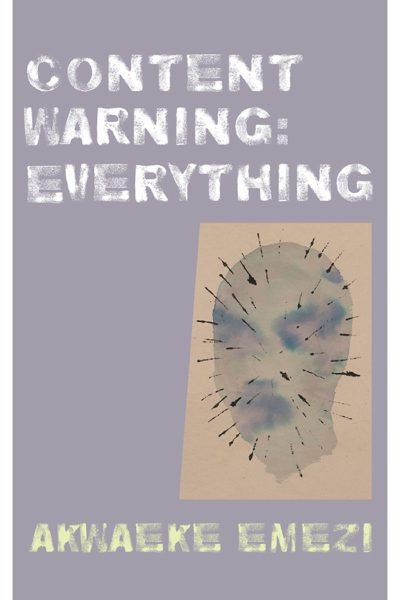
It seems odd that i'm sitting down to write a perfect review of a book that has, as far as a book can screw up a life, sent my own careening wildly off track.
My introduction to Emezi was the diabolical little YA spec fic Pet, which was assigned reading in my Transgender Literature class i took a few semesters ago. i was struggling with my academic workload, and admittedly only read pieces of that book, enough know what was going in class discussions, but shelved it to finish later. i did not realize at the time that i had one of the writer's other books in my possession already, a threatening little collection of poems that my best friend had gotten me for my birthday right before beginning the semester.
It sat on my shelf patiently, biding its time, dreaming its sick little dreams, until i needed it.
i can't tell you how the explosion happened, only that it did. Call it a gas leak, maybe. Entropy did as entropy does. i was separated, overnight, from everything smelling and tasting of home, born on Christian hands and pagan winds into the wild to be taught the true ways of the world. Apotheosis knocked for the third time in my heathen life, and this time i let the sonuvab!tch inside at last to make herself at home.
i found myself in a hotel room, on the other side of a bombing, stranded. This book was in my hands, had made it instinctively into my bag as i escaped the slithering fire that consumed my house and my life. i read the title, read the author's name, realized i had heard the name before. i ached for familiarity, and opened the book.
Everything was inside waiting for me inside, as Emezi warned. i blundered into the bloody-berry red thickets of their serpentine prose, joining them in their dirty, dismal trek up the Holy Mountain. i found, immediately, in their words, a kindred spirit, crimson as my own sin-stained soul. i can only be frankly honest: the poems in this collection seemed to resonate with my own life and its events to a degree that is uncanny, almost abject. The second poem, "christening", tore me open, and i understood, feverishly, wrongly: i too could speak the truth.
i took to my notebook, trying to put my frayed and desperate grief into words, grief at my sudden exile from Eden, using Emezi's words as model. i crafted my own imitative poems in the key of confession and launched them into the sky like a rocket, hoping to explain away the pain with meter and meaning. But like our viperous little narrator, the ouroboros sharing their tale with us, i swallowed myself with my own words, burned up in my own stomach acid, vomited myself out somewhere worse than before. My confessions did not cleanse me; they branded me Barabbas. My attempt to reach for the sky left me falling back towards earth, landing in a black muddy river, washing up somewhere by Bethlehem with venom in my eyes. As the book warns at the top, the urge to explain can often only make things worse when you see the world wrong.
It has since taken me five months to finish a book that is 45 pages long. i can't blame the book. It told me its mission on the front cover, warned me as well as a book can. It told me what was waiting inside: Everything, undiluted, unadulterated. This book blew my mind in the worst kind of way, which is of course the best way, which is of course the only way. Books are here to challenge us, to change the way we see. There is nothing comforting or safe about the work here, blowing past trigger warnings in a way that no edged-out Netflix comedian could hope to touch.
If you can handle it, allow Emezi to take a scalpel to your life, as they did mine. Inside you will find ruminations and meditations on what it means to be a pagan, to be spirit, to be of any faith or no faith, to be less than a man and more than a god and to do-se-do around the black heart of a dying, diseased brain. Big thanks to the bitch who bought it for my birthday, who read it and decided i should too. She's never let me down with a recommendation, and i'm happy to say this book continues that trend. It has been a campfire to sit beside in one of the darkest periods of my life, throwing shadows of hope against the wall even as the cave threatens to collapse down on top of us all.
#poetry#book review#poetry review#akwaeke emezi#religion#writing#bookblr#content warning: everything#queer poetry
0 notes
Text
Book Review: Dionysus in Exile: On the Repression of the Body and Emotion is an Antidote for the Aftermath, Antimatter for the Master Plan, Louder than God's Revolver and Twice as Shiny
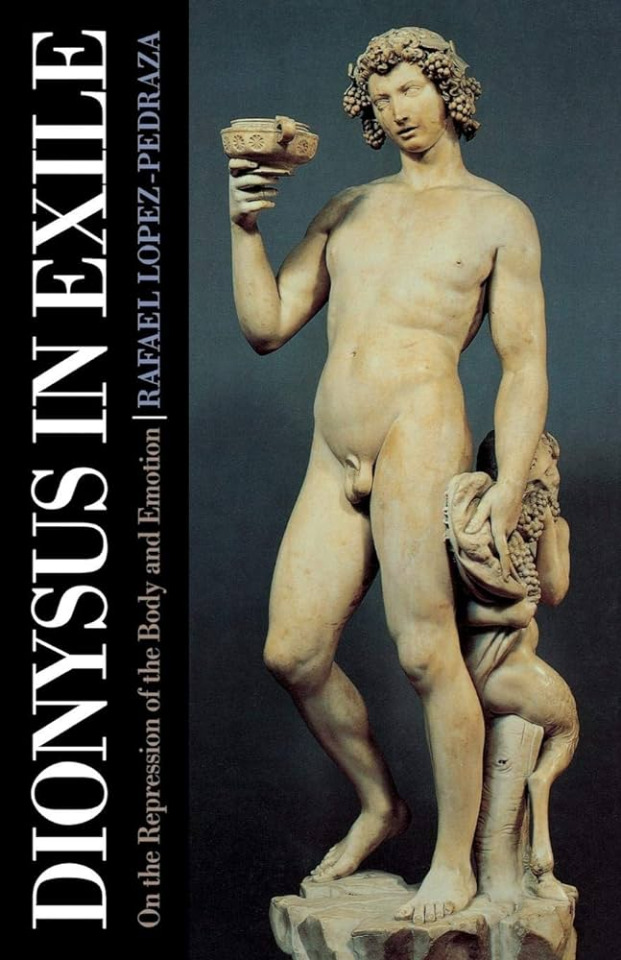
"What do you know of Bacchus?"
The question came to me in the dark, when i spent a week in the psych ward at the beginning of 2020, at the dawn of the pandemic. It was time for morning meds, and i was half asleep, and the orderly whispered it into my ear.
That question, once full of mystery, has become something almost threateningly mundane in my own life over the last few years. The knowledge that i am afflicted with Dionysiac madness as described here in Pedraza's text has been an everyday fact of my life for most of my adult life. Dionysiac imagery first began to call me early in my formal higher education, and has slowly colonized my life and mind like his sprawling, crawling vines. It's an odd thing, to slowly discover that not only are you not, as you had assumed for a long time, more or less an atheist, but believe in gods and monsters that are, culturally speaking, long dead.
... Or perhaps, as Pedraza posits, not dead at all, but merely, like Euripides, like Bacchus himself, in exile. Here, he conjures the ghosts of dancing women and satyric ravings, weaves them seamlessly into the struggles that plague our everyday modern lives. Though your tolerance for his arguments will likely be dependent on your views on Jungian psychotherapy as a whole, if you're willing to play along, he makes a strong case that our current mode of understanding madness and mental health, a system of temporary fixes that treat symptoms rather than help people process their underlying emotions, is limiting at best and actively harmful at worst.
If you are interested in working with Dionysus as patron in today's world, this book is required reading. Pedraza contextualizes Dionysiac practice and imagery organically within the fabric of contemporary life, and illustrates well both the benefits and the risks of a Dionysiac way of being. If you are not a true believer yourself, the stories here are nevertheless powerful parables that offer a wealth of opportunities for personal reflection. For myself, Pedraza's explanations of various aspects of Dionysiac worship echoed powerfully. Denial of faith, i have discovered, leads to disaster. Here, in his work, i found someone willing to sit me down, to speak to me frankly about what i have experienced and am experiencing as a madwoman from a long line of madwoman. Though little of the content in this book was entirely new to me, the writer was able to contextualize psychic phenomenon that i have experienced firsthand, such as Dionysiac possession, in ways that have provided clear affirmations in the face of doubt. His descriptions of Hellenistic practice as a system of collaborative rather than competitive modes of worship between sects rings particularly powerful in a highly combative world. Dionysus offers truth in multiplicity.
It is written in an extremely accessible and engaging way, the essay itself possessing an extremely vibrant poetic rhythm. The supporting quoted selections throughout the the book are consistently well-chosen and integrated into the text. If you have little pre-existing knowledge of the subjects, the basics of who Dionysus is and what he represents are well-presented. Where the text falters, it is in its limited perspective on queerness and a few suppositions about the gendered aspects of Dionysiac worship that are, while not offensive, perhaps reductive or not explained in enough detail to support the suppositions made.
Offering Dionysiac practice as a balm against our accelerated future-driven lives, offering a way to reconnect with death and ego death, Pedraza has given those interested in dancing the path of the Maenad an indispensable gift.
#dionysus#dionysian#hellenistic pagan#hellenic pagan#jungian psychology#psychotherapy#bacchus#greek mythology#the bacchae#pentheus wept#book review#books#bookblr#reviews
9 notes
·
View notes
Text
Film Review: Midsommar Reveals the Unspeakable Horror at the Heart of Going Over to Dinner at Your Swedish Friend's House

So, this was a weird one to watch with my mom and sister over Christmas break, 2021, while i recovered with her from a tumultuous emotional upheaval in my life. You know when your anarchist food distribution network implodes on itself because of assault allegations, and then your entire life blows up from the emotional fallout because you were supposed to move in with the guy at the center of it all? No? Well, when that happens, it leaves you in the right frame of mind to suggest Ari Aster's Midsommar as a perfect bit of family bonding to watch with your death doula mother and estranged intrepid globe-trotting sister. "You guys like psychological thrillers, right?" i naively said, queuing the film up. As Mr. Aster so beautifully illustrates in this nasty little movie, there truly is no place like home for the holidays.
My first viewing of the film had been two years earlier, when i was living in a thirty-bedroom party house near a large university, which was honestly pretty similar to the sinister Nordic society that Aster dreams up here. i was myself (allegedly) on shrooms when i wandered into the living room to see Florence Pugh's simpering, miserable face, surrounded by breathing flowers.
It wasn't until later, viewing the film in full with a close friend in their room, that i realized the flowers in this movie are just f**kin' like that.
i had seen the trailers for the film, been interested, and promptly forgotten of its existence, having not yet seen Aster's previous nightmare, Hereditary. Watching it that night in my friend's darkened lair of a room, stoned to the bone while she ran torture mods on her Sims on her laptop, i was a changed woman. i was, now and forever, Ari Aster's little bitch, cursed to simp for everything the man touches until i am pushed from the top of the senior citizen high dive cliff myself.
i'll be the first to admit that Aster by no means makes perfect films. Built on the bones of classical tragedy and comedy the way they are, they are rudimentary films, hardly cerebral like his contempories Eggers and Peele. There is something almost primal about Aster's gaze. Pelle sums it up best, as he explains the function of his remote village's midsummer festival to the film's protagonist Dani: "It's like a play," he says. Indeed, as Hereditary turns a bare bones haunted house story into a Greek tragedy, this film turns the macabre pageantry of rustic European folk dancing into a basic, almost paint-by-numbers, slasher flick. The cast of mostly disposable college students are picked off one-by-one by the rural pagans. It's hardly breaking new ground here—but treading old ground seems to be Aster's primary project. The man dances on top of graves with a wicked abandon, and if you're not privy to his particular brand of self-aware theatre kid shenanigans, it can be... a lot.
My mother and my sister were, for example, less than enthralled with my gushing over the ways Aster deftly compares the base, cathartic tradition of watching a bunch of co-eds get their shit wrecked with ooky-spooky horror-fied neopagan rituals. What can i say? i thought that she, as a hospice nurse who studies death practices around the world, would think it was interesting.
At its core, Midsommar is a movie about losing all the stability in your life, and having it completely colonized by found family, like honey bees building their hive in the skull of a lion. Found family is usually a treacly trope, one which ties characters together through strength found in their shared struggled against adversity. Midsommar flips that on its head, introducing us, in a manner not unlike Disney's classic film Meet the Robinsons, to the adoptive familial unit from hell. It raises the spectre of classic daylight horror cinema like The Wicker Man, trampling on its burial mound with manic dancing feet. Family traditions can be murder. As stated, the message is blunt as a hammer. Aster is not a subtle film-maker. Indeed, the opening shot establishes the whole film, just as in Hereditary, as nothing but an elaborate puppet show where the puppets bleed. A lot. In many respects it is the same movie told over again, with Aster's dolls moved from the dollhouse to the garden outside.
Simply put, the movie is incredibly pretty, incredibly fun if you're into this kind of things, absolutely insufferable if not. The soundtrack, color-grading, and ending sequence are transcendent. When Father Odd tells Dani "Welcome home," upon arriving in the village, you will either fall for their intoxicating spell, or you'll be smart enough to get the hell out.. Either way, i recommend it heartily, and can not recommend (allegedly) dropping shrooms at the same time as the characters in the film enough.
Read on LetterBoxd HERE.
3 notes
·
View notes
Text
eden all over
we (A)re in the garden again, where nothing ever seems to grow straight
all of the peaches look like poison apples
and all of the poison is inside of my heart
care to take a bite?
care to come inside?
care to hand me the sword and cleave me in two?
go on then
if you have the nerve
if not, get back to work naming names
and laying blame
2 notes
·
View notes
Text
i want someone who will sit on a rooftop with me at 3 am and shave their head while i shave my head and then hotglue the hair to the roof so the roof will have hair
378K notes
·
View notes
Text
i want someone who will sit on a rooftop with me at 3 am and shave their head while i shave my head and then hotglue the hair to the roof so the roof will have hair
378K notes
·
View notes
Text
i made ziiiiiiines for tomorrow's @dionysianpubliclibrary release!!!!
back hurts from assembling but GOD i love making zines!!!
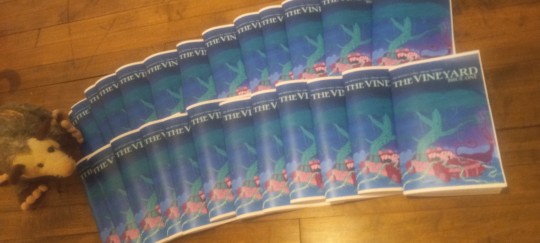
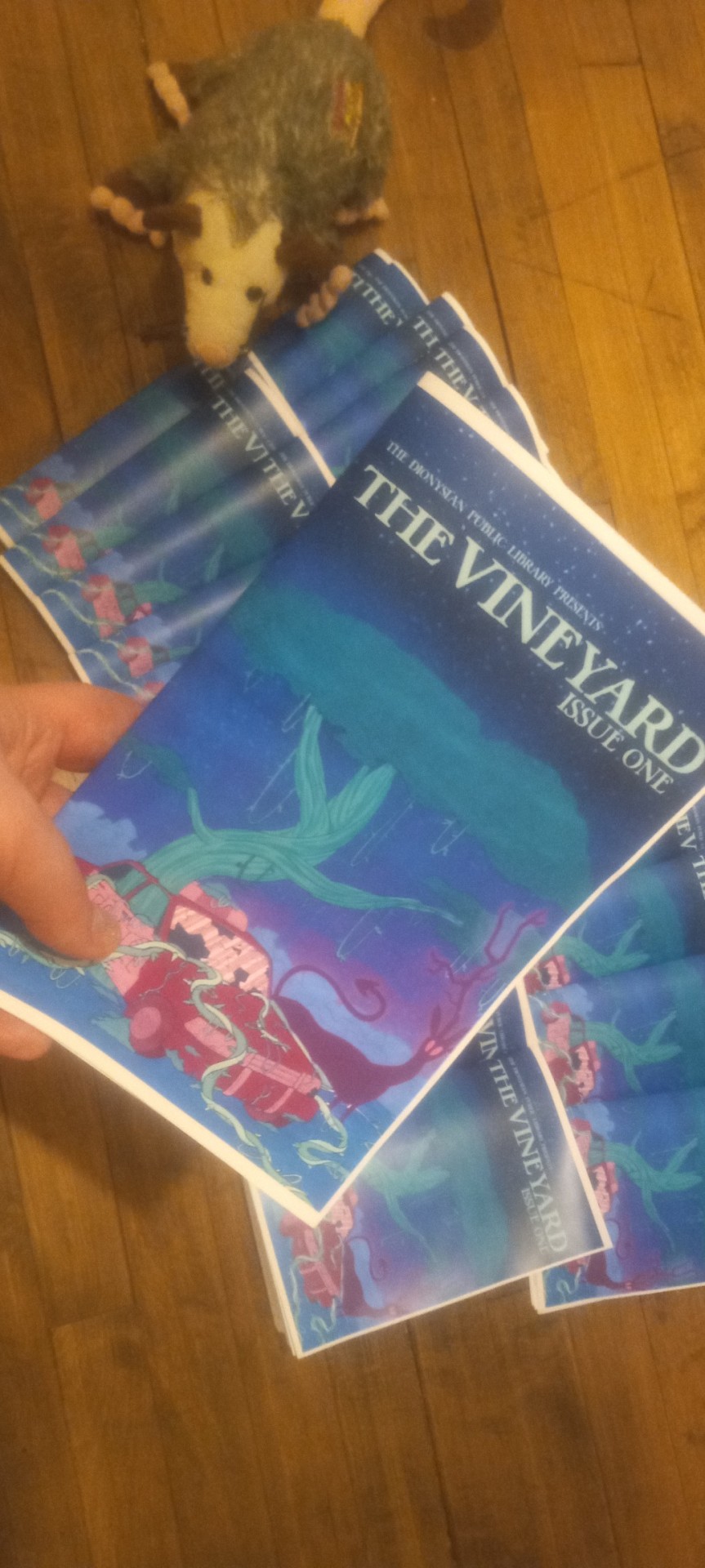
2 notes
·
View notes
Text
first house show in over a year
maybe my life can finally return to something approximating normal


0 notes
Text
goin' to a house show tonight
just realized last night i literally didn't go to a single house show in 2022
what the fuck was last year
1 note
·
View note
Text

he's a manic pixie dream girl except he's a depressed alcoholic middle aged man
28K notes
·
View notes
Text

Blood in my teeth, I bite like a stray dog
Got dogpilled by @husborth and I had to draw something based on Anakin’s caninisms
628 notes
·
View notes
Note
oh hey look it's my cat and his boyfriend :3
your cat’s boyfriend ;_; so sweet ;_;
please enjoy a rare image in which they are both clearly visible

my cat on the left, his boyfriend on the right
46 notes
·
View notes
Text

Detective Comics #586
2K notes
·
View notes

